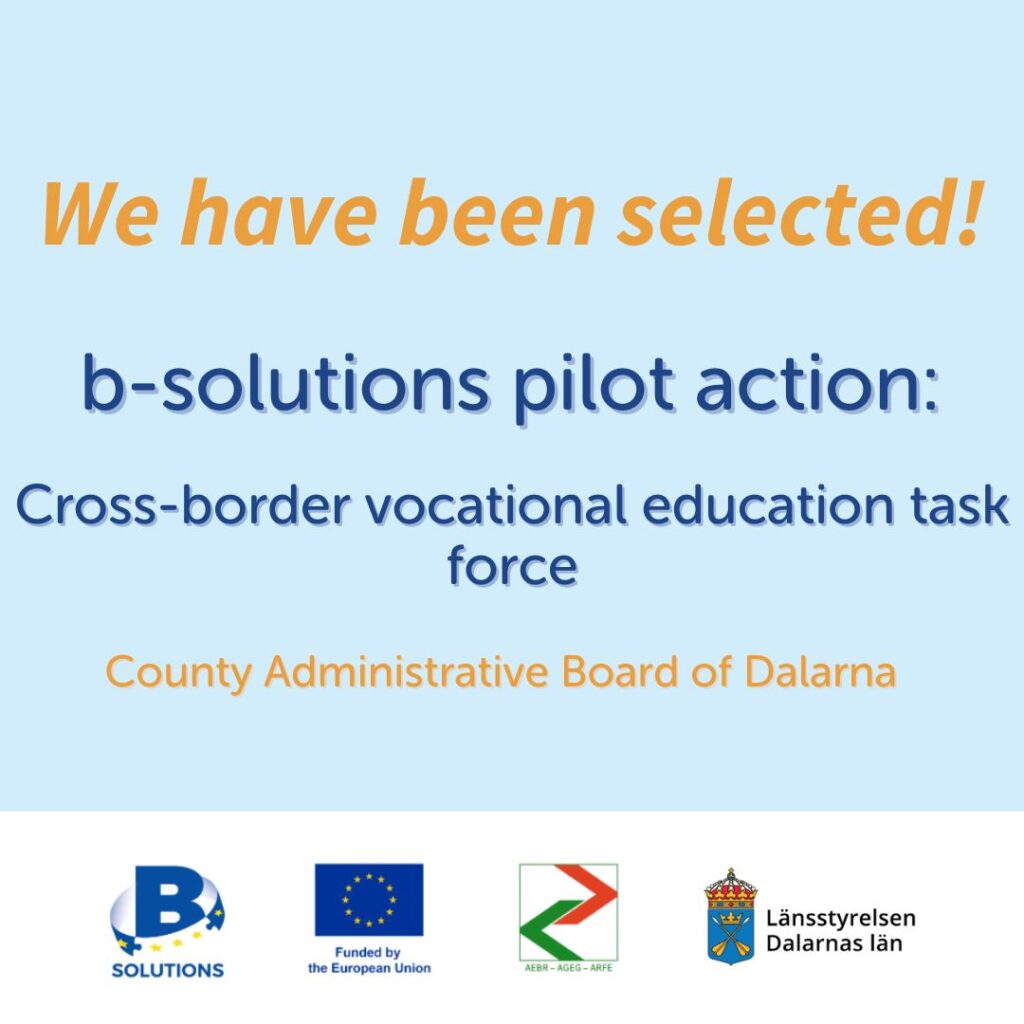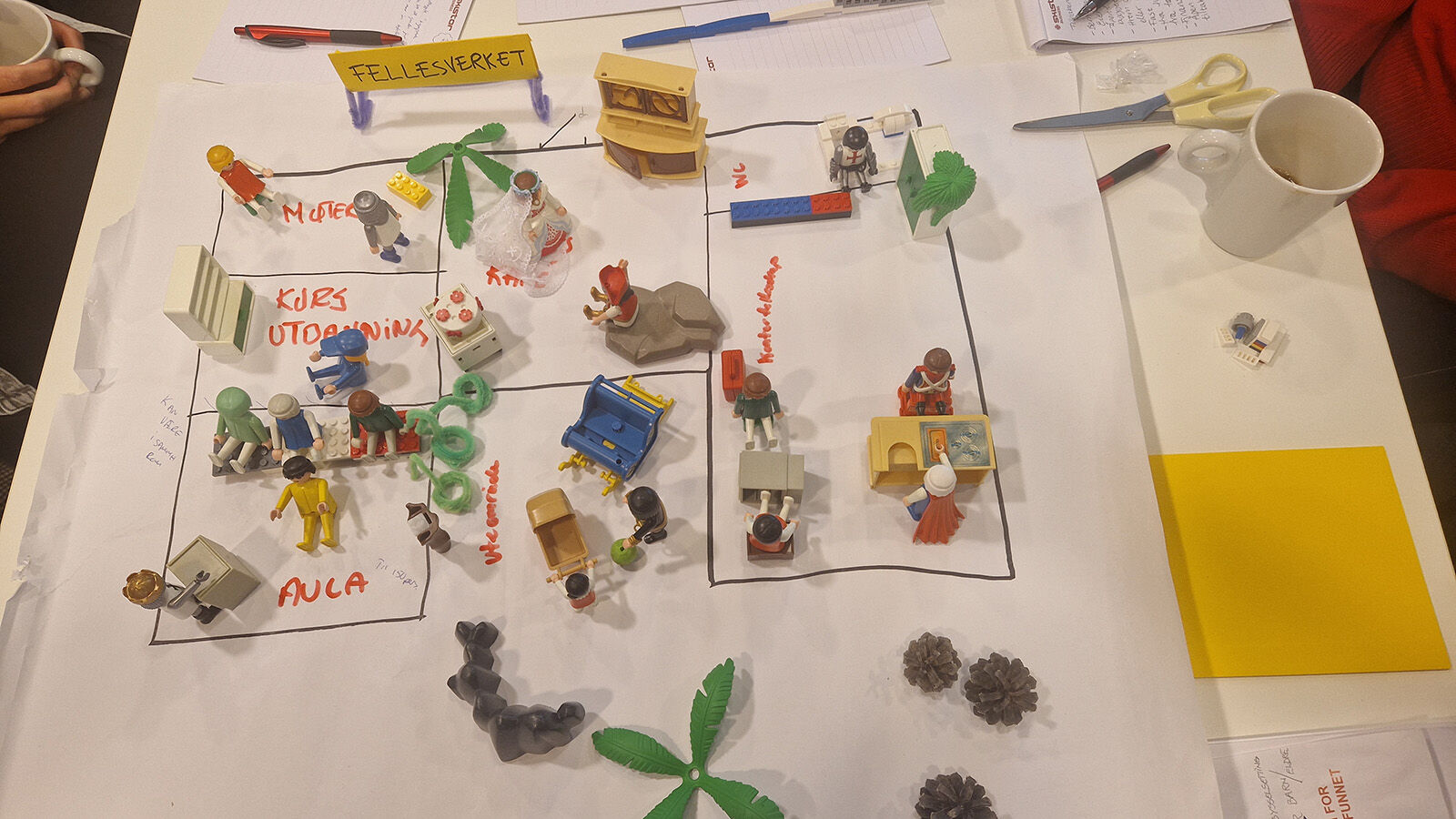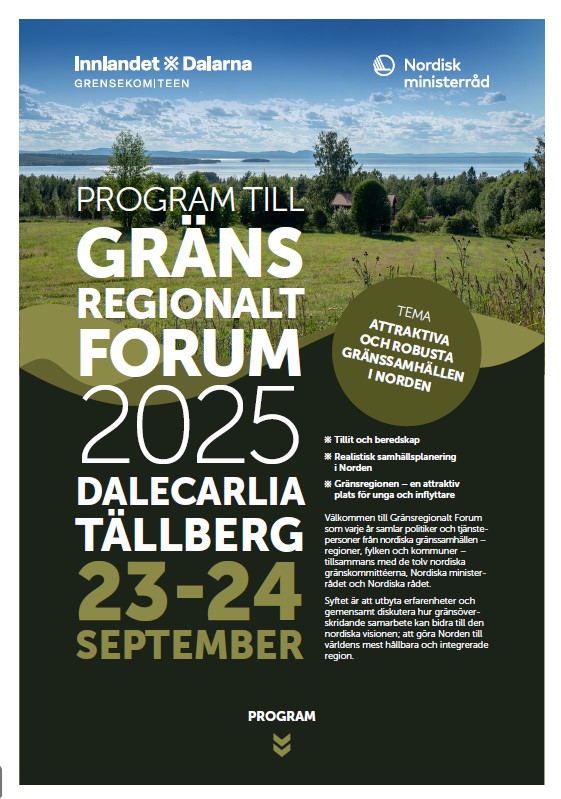Title of the proposed pilot action:
Cross-border vocational education task force
Border area concerned by the pilot action
The activity will cover 6-8 municipalities along the Swedish-Norwegian border, covering a rather large but sparsely populated territory in central Scandinavia. The municipalities are located between the county administrative capitals of Falun in Sweden and Hamar in Norway.
Applicant’s and partner’s mandate to devise solutions
The applicant, Länsstyrelsen Dalarna (County administrative board of Dalarna) has the responsibility to coordinate and implement government policies on regional level. The applicant is, together with the project partners, member of the Border Committee and as such working to improve attraction and competitiveness in the border region.
Project partners, Region Dalarna (County Council of Dalarna) and Innlandet Fylkeskommune (Innlandet County Administration), are responsible for overall development on regional level and when it comes to competence they are responsible on the regional level to coordinate competence development in the regions they administrate.
When it comes to education it is the municipalities that are responsible to supply educational offers in Sweden and the Dalarna County Administration is responsible for coordinating the regions competence needs. For upper secondary level and higher vocational education, the County Administration has a special responsibility to support national authorities in planning the range of education in the county.
In Norway Innlandet county administration is responsible for education and competence development in the county of Innlandet. Regarding to vocational education the county administration has a special responsibility to improve access to qualified and relevant labour, mapping regional competence needs and facilitating requested training measures.
Thematic area of the pilot action
Labour markets and education (education and training)
Description of the obstacle
The b-solution study showed that there improvement of educational offers in the border region is substantial. A very strong economic development in the region paired with small labour markets are challenging. On the other hand the study could prove that there are good possibilities for an exchange of students between Sweden and Norway, due to the Nordic agreement of 2004 allowing students to study in other Nordic countries on state expense. Furthermore the study found that certain difficulties combined with internships and apprenticeships have in practice been solved where this has been relevant. The study stated that there are no legal obstacles for cross border education but that in practice these possibilities are not used due to administrative obstacles. Authorities and students simply don’t know about the education system, its offers and its possibilities on the other side of the border. This could be confirmed by the Border Committees follow up meetings with stakeholders gathering education providers, enterprises and authorities responsible for education and competence.
The b-solution report identified three topics to work on in order to solve the educational challenges: A) The development of a new bilateral upper secondary education of snow technicians. An education requested by many companies in the border area. B) Initiating possibilities for retraining and adult education. C) Recruitment of young people to existing educations within areas with exceptional high recruiting needs such as care and healthcare.
The border committee has so far initiated activities for topic A and B.
Topic A) The Border Committee has facilitated the development of a vocational college program for technical operations personnel in mountain destinations. Initiatives are ongoing on both the Swedish and Norwegian side. In Norway a study is carried out in collaboration with the Vocational College Project in South Østerdal to investigate the content of a new program for snow technicians. Meetings have been held with stakeholders, and work has started to draft a preliminary outline of the content of a specialized education. On the Swedish side an application for a specialized ski-lift technician education has been delivered to the national organization responsible for higher vocational adult education. News on approval or dismissal of the application is expected in may 2025.
Topic B) After a number of meetings with stakeholders discussing the possibilities of cross border education a pre study application has been delivered to the Interreg Sweden Norway program to investigate the possibilities of establishing a cross border career center. In collaboration with Karriere Innlandet, responsible for adult education in Innlandet County and municipalities of Torsby and Älvdalen in Sweden the pre study will map existing programs and facilities for vocational education in the border region and investigate the possibilities of expanding the existing career-center system of Innlandet county across borders.
Potential increase in cross-border cooperation
With this project we want to address the third topic highlighted in the b-solution report. That is to better use existing educational offers in the border.
Making educational offers more available for students and workers on the other side of the border will open up for a series of cooperations between educational authorities and other stakeholders across borders: Educational offers can be coordinated and more courses can be offered. Customized offers can be elaborated and matching activities across borders implemented. Cooperation can be started to build a common labour marked across borders.
There is an awareness that in the sparsely populated border region this will only be possible by making educations available cross border allowing for increased customized on spot education that allows retraining of adult people and education of young people without need of leaving the area. This is a strategic educational goal for regional educational authorities on both sides of the border.
However, currently cross – border cooperation of educational players in the border area does not exist. The project wants to change that.
Solution aimed for and specific objectives of the pilot action
The project wants to establish a cross border vocational education task force
consisting of responsible regional educational authorities in the Dalarna – Innlandet border region. The task force will be active the coming 2-4 years and work for increased integration of cross border educational systems and an elevated share of labour force using educational offers at the other side of the border.
The task force initial objective is to a) develop a cross border competence forum coordinating educational needs in the border region, b) develop and test a cross border student-for-one-day program giving pupils the possibility to test the school system across border during one day and c) launch a cross border initiative communicating educational offers to companies and primary schools in the border region.
The task force will be operated and coordinated by Innlandet-Dalarna Border Committee and supervised by its steering group.
Expected long-term impact on target groups or the general public
Establishment of a cross-border competence forum will create a platform for education providers, municipalities and companies to meet across border and coordinate educational offers. This structure is missing today and is a prerequisite for establishment of a cross border labour market.
Communicating educational offers on the other side of the border and student-for-one-day activities will give adults in need of retraining and pupils interested in vocational education the possibility to choose from more educational offers, making it possible to supply enterprises with highly qualified workers. The possibility to customized on site education increases and the risk of work force leaving the area for studies decreases. Municipalities can make better use of existing labour force to meet growing recruitment needs.
Replicability of the pilot action
The demographic challenge is similar all over Europe. With fewer young people the risk increases that courses will have to be laid down. Instead of meeting enterprises needs of specialized labour educational offers will rather decrease. Educational cooperation across border will be an issue along all border areas in Europe in order to meet the needs of the new industries. Examples of cross border task forces and cross border competence forums will be of good use for many border regions. In the Nordics, several other border committees have shown interest in our approach and the topics highlighted by the b-solution investigation. Some of our first results will be presented in the cross border forum arranged by the Nordic Council and the Nordic border committees in September 2025. Supposedly the result of our concept will be interesting even for non Nordic regions.
Description of the activities to achieve the above objectives
The activities will be carried out in four work packages:
Establishment of task force:
The task force consists of the four members of the border committee with responsibility for the regional development: Dalarna County Council, Innlandet County Council, County Administrative Board of Dalarna, County Administrative Board of Innlandet. The task force will meet four times for planning of activities.
The task force pushes forward activities in order to meet the set of objectives which are:
Developing a cross border competence forum:
The forum consists of parties with responsibility for adult learning and coordination of primary and secondary education and training at the regional level. The forum will create good framework conditions for work locally/regionally by placing expertise in a strategic context, contributing to cooperation, providing input to policy development and developing arenas for competence development, exchange of experience and implementation of studies. Representatives from the municipalities, high schools, local companies, Dalarna County Council and Innlandet County Council will be invited to a start up meeting. Results of the Interreg-pre study will be presented in a dissemination meeting for all stakeholders and guidelines for future meetings will be established. A yearly regional cross border competence cooperation meeting will be initiated.
Developing at cross border student-for-one-day program:
Experiences of existing student-for-one-day programs will be gathered and shared with secondary schools and vocational schools in the border region. Interested schools will be supported in marketing their offers, in guidance of visiting pupils and in the test of the concept. The goal is to establish the concept in 1-2 schools at each side of the border and to get 5-10 pupils to test the concept.
Marketing educational offers cross border:
The educational offers mapped in the interreg study will be analysed by the task force and competence forum. A communication consult will be hired to process the data and make it available for marketing cross border on digital platforms and with flyers used by student counsellors. A meeting with local education stakeholders and regional authorities will be held to share and discuss the offers and how they can be used.
Are you planning to subcontract a third party to carry out any activities as part of the pilot action?
Yes
Please provide a brief explanation of the need for sub-contracting costs and how they contribute to achieving your project’s objectives.
Subcontracting is needed for two reasons: In order to engage stakeholders in the new concept of “student for one day” it will be needed to refund schools for part of their work. The refund will be set to max 10 hours per participating school and an hourly rate of 50 euros. Only schools participating in the exchange program and with delivered timesheets will be refunded. The other subcontractor will be an communication office providing campaign material for student-for-one-day activities. That will include a template on available vocational courses in the border region suitable to present on the schools home pages. It will also include flyers for participating schools that can be handed out by student counsellors in secondary schools.
Please provide a brief explanation of the need for travel and accommodation costs and how they contribute to achieving your project’s objectives.
Several cross border meetings and conferences will be needed to engage stakeholders in the task-force work and commitment to the objectives. That includes one physical meeting for the task force members, two meetings for members of the trans border competence forum (start and dissemination) and a meeting for schools participating in student-for-one-day campaign. Costs arise for hotell stay for educational experts and project partners and conference costs for task force meetings, competence forum meetings and meetings with schools.
Please provide a brief explanation of the need for purchase costs and how they contribute to achieving your project’s objectives.
No purchase cost are needed
Please provide a brief explanation of the need for staff costs and how they contribute to achieving your project’s objectives.
Staff costs constitute of costs for a project manager coordinating project activities and reporting and a minor cost for an economist supporting with economic reporting. The estimated budget is 160 hours for project manager and 15 hours for economist.



